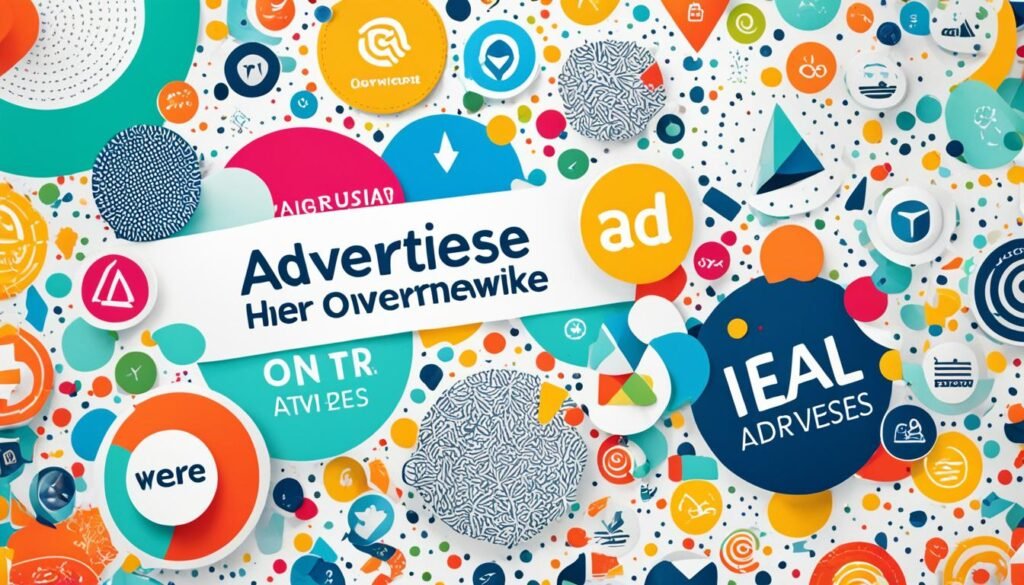How Can I Earn Money from My Website? Now that you’ve got your website online, you may be wondering how to monetize it and turn it into a profitable venture. Fortunately, there are several effective strategies for earning money from your website. In this guide, we’ll explore the best ways to monetize your website, from affiliate marketing to selling products and services, so you can start generating income from your online platform.
Key Takeaways: Money from My Website
- Affiliate marketing allows you to earn a commission by promoting products or services on your website.
- Displaying ads through ad networks like Google Adsense or Media.net can generate income through pay-per-click or cost-per-impression models.
- Selling digital or physical products directly from your website can be a lucrative monetization strategy.
- Sponsored posts and product reviews offer opportunities to earn money by collaborating with brands.
- Offering premium content or creating a membership site can provide a recurring revenue stream.
Affiliate Marketing
Affiliate marketing is a popular and effective way to monetize your website. By promoting products or services through your website, you can earn a commission for each sale or action made through your affiliate link.
Joining affiliate programs and networks opens up a vast range of opportunities to earn commissions. Platforms like Awin and Skimlinks provide access to thousands of affiliate programs, allowing you to choose products or services that align with your website’s niche and target audience.
How Does Affiliate Marketing Work?
When you join an affiliate program, you receive a unique affiliate link. You can include this link within your content, such as blog posts, reviews, or recommendations. When a visitor clicks on your affiliate link and makes a purchase or completes a desired action, you earn a commission.
The commission structure varies depending on the affiliate program, but it typically ranges from 2% to 10% of the sale. Some programs may also offer performance-based incentives or bonuses.
The Benefits of Affiliate Marketing
Affiliate marketing offers numerous advantages for website owners:
- Passive income: Once you’ve set up your affiliate links, you can earn commissions while you sleep.
- No customer service: As an affiliate, you don’t have to handle customer inquiries, complaints, or product fulfillment.
- Diversify revenue streams: Affiliate marketing allows you to supplement other monetization methods, such as ads or selling products.
- Build trust and credibility: By promoting quality products and providing honest recommendations, you can establish trust with your audience.
Integrating Affiliate Links
When incorporating affiliate links into your content, it’s important to do so naturally and transparently. Disclose any affiliate relationships to maintain ethical practices and comply with advertising regulations.
Here’s an example of how you can seamlessly integrate an affiliate link:
“I recently purchased XYZ product, and it has completely transformed my cooking experience. If you’re looking for high-quality kitchen gadgets, I highly recommend giving it a try. You can find it here.”
Affiliate marketing offers a win-win situation for both website owners and businesses. Website owners can earn commissions, while businesses can reach new audiences through affiliate partnerships. Start exploring affiliate programs and networks today to unlock the potential of affiliate marketing for your website.
Ads and Ad Networks

Monetizing your website through ads is a popular way to generate revenue. By displaying ads on your site, you can earn money from clicks or impressions, depending on the ad network you choose. Two prominent ad networks you can consider are Google Adsense and Media.net. Let’s explore how ads and ad networks can help you monetize your website.
Pay Per Click (PPC) Advertising
One way to earn money from ads is through Pay Per Click (PPC) advertising. With PPC, you get paid when visitors click on the ads displayed on your website. A well-known PPC platform is Google Adsense. By signing up for an Adsense account and integrating their ad code into your website, you can start earning money for each valid click on the ads.
If you have a high-traffic website or a niche audience, you can potentially generate more income through PPC advertising. As more visitors click on the ads, your earnings increase. However, it’s crucial to ensure that the ads are relevant to your website’s content, as this enhances the likelihood of attracting clicks from interested users.
Cost Per Impression (CPM) Advertising
Another approach to earning money through ads is Cost Per Impression (CPM) advertising. With CPM, you get paid based on the number of impressions the ads receive, regardless of whether users click on them. Media.net is a popular ad network that offers CPM advertising.
Unlike PPC, where clicks are crucial for earning money, CPM focuses on the visibility and exposure of ads on your website. The more impressions the ads receive, the higher your potential earnings. Displaying ads in prominent positions and optimizing your website’s traffic can help maximize your CPM revenue.
As your website grows and attracts more visitors, you may consider exploring premium ad networks like Monumetric, Mediavine, or AdThrive. These networks typically offer higher ad rates and additional monetization features, helping you increase your earnings from ads.
Remember to strike a balance between displaying ads and maintaining a positive user experience. Excessive or intrusive ads can detract from your website’s quality and discourage visitors from returning. Choose ad placements that blend seamlessly with your website’s design and content, ensuring they enhance rather than disrupt the user experience.
Adding relevant, well-placed ads to your website can be a lucrative way to monetize your online platform. Explore different ad networks, such as Google Adsense and Media.net, to find the option that aligns best with your website’s niche and target audience. As your website grows, consider upgrading to premium ad networks for even higher earnings.
Selling Products

One of the most effective ways to monetize your website is by selling products directly to your audience. Whether you have digital products such as eBooks, printables, or online courses, or physical products like t-shirts or handmade crafts, setting up an eCommerce store on your website allows you to generate revenue and provide value to your visitors.
If you’re looking for a convenient and user-friendly platform to build your online store, Shopify is a popular choice among entrepreneurs. With its robust features and customizable templates, Shopify empowers you to create a professional-looking online store without the need for extensive coding knowledge. It also provides secure payment gateways, inventory management tools, and marketing integrations that streamline the selling process and help you grow your business.
Selling digital products has its advantages as well. With lower overhead costs and no physical inventory to manage, digital products offer a scalable and cost-effective way to generate revenue. You can create and sell eBooks, online courses, or even software applications that cater to your audience’s needs and interests. Platforms like Teachable or Podia provide easy-to-use tools for creating and selling digital courses, while marketplaces like Gumroad or SendOwl allow you to sell and deliver digital products directly to customers.
If you offer physical products, it’s important to consider logistics, such as inventory management, shipping, and fulfillment. Partnering with reliable fulfillment services like ShipBob or Fulfillment by Amazon (FBA) can help streamline your operations and ensure a smooth customer experience. Additionally, implementing a user-friendly shopping cart system and optimizing your checkout process can help minimize cart abandonment rates and increase conversions.
No matter what type of products you choose to sell, it’s crucial to focus on creating high-quality, valuable offerings that align with your website’s niche and audience. Pay attention to customer feedback and continuously improve your products based on their preferences and demands. By providing exceptional products and a seamless purchasing experience, you can turn your website into a successful online store.
“Setting up an online store is an excellent opportunity to showcase your unique products and connect directly with your customers. By identifying your target audience and offering valuable products, you can create a profitable eCommerce business.” – Chloe Bennett, Founder of Chic Crafts
Sponsored Posts and Reviews

One lucrative way to monetize your website is through sponsored posts and product reviews. These opportunities allow you to earn money by writing about a company’s products or services and sharing your honest opinions and experiences with your audience.
Brands may reach out to you directly, providing articles to publish on your website along with compensation for your time and effort. Alternatively, you can seek out partnerships through platforms like Tomoson, where businesses actively search for influencers and content creators to promote their offerings.
When creating sponsored content, it’s important to maintain transparency and comply with advertising regulations. Disclosing that the post is sponsored helps build trust with your audience and ensures ethical practices.
Product reviews can be a powerful way to showcase your expertise and help your audience make informed purchasing decisions. By sharing your insights and providing valuable information, you can attract loyal readers and potentially generate revenue through affiliate marketing or sponsored content opportunities.
Remember, authenticity is key in sponsored posts and reviews. Your audience trusts your opinions, so it’s crucial to remain honest and transparent throughout the process.
The Benefits of Sponsored Posts and Reviews:
- Opportunity to earn money through compensation from brands
- Showcase your expertise and knowledge in your niche
- Build strong relationships with brands and explore potential long-term partnerships
- Provide valuable information and help your audience make informed purchasing decisions
- Potential for additional revenue through affiliate marketing and sponsored content
“Sponsored posts and product reviews open up new income streams while allowing you to share valuable insights with your audience.” – Influencer Marketing Expert
Premium Content and Membership Sites

Offering premium content behind a paywall or creating a membership site can be an effective way to monetize your website and generate a recurring revenue stream. By providing valuable and exclusive content to members, you can attract and retain subscribers who are willing to pay for access to your best material.
Members-only content allows you to offer unique and specialized information that is not available to the general public. This exclusive content can include in-depth tutorials, expert interviews, industry insights, and valuable resources that your audience can’t find elsewhere. By positioning your website as a source of premium information, you can attract a dedicated community of subscribers who value the expertise and value you provide.
One popular method of monetizing premium content is through premium subscriptions. By charging a monthly or annual fee for access to your exclusive content, you can create a predictable income stream while providing ongoing value to your subscribers. This subscription model encourages recurring revenue, allowing you to build a stable and sustainable business.
When creating premium content, it is crucial to ensure that the information you offer is genuinely valuable and worth paying for. Take the time to research and understand your target audience’s needs and interests, and tailor your content accordingly. The more valuable and unique your content is, the easier it will be to convince potential subscribers to invest in a premium subscription.
Membership sites provide a platform for organizing and delivering your premium content to subscribers. These sites often include features such as user login systems, content management, and payment processing. You can choose from a variety of membership site platforms, including WordPress plugins like MemberPress or dedicated software like Kajabi. Select a platform that suits your needs and offers the necessary functionality to support your premium content offerings.
By leveraging premium content and membership sites, you can create a thriving online community while generating a steady stream of income. Remember, the key to success in this model is to consistently provide valuable and exclusive information that keeps your subscribers engaged and coming back for more.
Benefits of Premium Content and Membership Sites
Here are some key benefits of utilizing premium content and membership sites:
- Recurring revenue: Generate predictable income through ongoing subscriptions.
- Exclusive content: Offer valuable information that is not available elsewhere.
- Engaged community: Cultivate a dedicated audience who values your expertise.
- Greater trust and loyalty: Subscribers who invest in premium content are more likely to have a stronger connection to your brand.
- Long-term relationships: Build lasting relationships with your subscribers, leading to higher customer lifetime value.
| Platform | Features | Pricing |
|---|---|---|
| MemberPress | User login system, content access control, payment gateways integration | Basic: $149/year Plus: $249/year Pro: $349/year |
| Kajabi | Content management, website builder, email marketing, community features | Basic: $119/month Growth: $159/month Pro: $319/month |
| Wild Apricot | Membership management, event registration, email newsletters | Free trial available Starts at $40/month |
Remember, when implementing a premium content strategy, always focus on delivering value and maintaining a strong relationship with your subscribers. Premium content and membership sites can be a powerful tool for monetizing your website while providing an exclusive and enriching experience for your most dedicated audience.
Building Email Lists and Email Marketing

Building an email list from your website is a valuable strategy for engaging with your audience and driving conversions. Email marketing allows you to nurture relationships with your subscribers and promote products or services directly to their inbox. With the right tools and strategies, you can maximize the effectiveness of your email campaigns and generate revenue for your online business.
The Power of Email Lists
An email list consists of subscribers who have willingly shared their email addresses and expressed interest in hearing from you. These subscribers are often more engaged and receptive to your marketing messages compared to casual website visitors. By building an email list, you have a direct line of communication with your target audience, allowing you to provide valuable content, share updates, and drive conversions.
Choosing the Right Email Marketing Platform
When it comes to managing and optimizing your email marketing efforts, using a reliable platform is crucial. AWeber is a popular choice among marketers for its user-friendly interface, robust features, and excellent deliverability rates. With AWeber, you can easily create visually appealing emails, segment your subscribers, automate campaigns, and track key metrics to measure your success.
Building Your Subscriber Base
There are several effective strategies for growing your email list:
- Offer valuable incentives such as free ebooks, exclusive content, or discounts in exchange for email sign-ups.
- Place prominent opt-in forms in strategic locations on your website, such as the sidebar, footer, or popup windows.
- Run contests or giveaways that require participants to provide their email addresses for entry.
Engaging and Segmenting Your Subscribers
Once you have subscribers on your email list, it’s important to engage them with relevant and compelling content. Segmenting your subscribers based on their interests, preferences, or demographics allows you to send targeted emails that resonate with each segment. Personalization and tailored messaging can significantly improve open rates, click-through rates, and conversions.
Leveraging Email Marketing for Affiliate Promotions
Email marketing presents a valuable opportunity to boost your income through affiliate promotions. As an affiliate marketer, you can selectively recommend products or services to your subscribers and earn commissions for sign-ups or purchases made through your unique affiliate links. Be sure to disclose your affiliate relationships transparently to maintain trust with your audience.
Email marketing is more than just sales pitches. It’s about building relationships and providing value to your subscribers. Offering informative content, exclusive promotions, and personalized recommendations can help you cultivate a loyal and engaged audience.
Tracking and Optimizing Your Email Campaigns
Measuring the effectiveness of your email campaigns is essential for continuous improvement. AWeber provides robust analytics and reporting features that help you track open rates, click-through rates, conversion rates, and more. By analyzing these metrics, you can identify areas for optimization, iterate on your strategies, and refine your email marketing efforts for maximum impact.
In conclusion, building an email list and implementing an effective email marketing strategy are essential for driving engagement, promoting your products or services, and generating revenue. Leveraging a reliable platform like AWeber can streamline your efforts and help you build strong relationships with your subscribers. Remember to provide valuable content, segment your audience, and track key metrics to continuously refine and optimize your email campaigns.
Webinars and Online Courses

If you’re looking to monetize your website and share your expertise with others, hosting webinars and creating online courses can be lucrative options. By offering valuable educational content, you can generate income through ticket sales or course fees.
Webinars provide a live platform for you to deliver high-quality information directly to your audience in real-time. This creates a sense of exclusivity and engagement, allowing participants to interact with you and ask questions. Platforms like Webinars OnAir offer a range of features, such as redirecting after registration and charging attendees for access.
In addition to webinars, online courses allow you to package your knowledge into digital products. These courses can be sold on your website or through popular e-learning platforms like Udemy. By structuring your content into a comprehensive curriculum, you can provide a step-by-step learning experience for your students.
Benefits of Webinars and Online Courses
1. Education and Personal Growth: Webinars and online courses provide a valuable opportunity for people to learn new skills, gain knowledge, and improve themselves.
2. Flexibility and Convenience: Participants can attend webinars or access online courses from anywhere, at their own pace and convenience. This makes it easy for individuals to fit learning into their busy schedules.
3. Expertise and Authority: Hosting webinars and creating online courses establishes you as an expert in your field. It allows you to showcase your knowledge and build credibility with your audience.
4. Revenue Generation: By charging for webinars or online courses, you can generate a steady stream of income. This can be particularly advantageous for niche topics or specialized expertise.
5. Community Building: Webinars and online courses provide an opportunity to connect with like-minded individuals. Participants can engage with each other, ask questions, and foster a sense of community around your content.
Case Study: John’s Successful Online Photography Course
“I started offering online courses to share my passion for photography. Through my website, I created a comprehensive course that covered everything from basic camera settings to advanced composition techniques. The course included video lessons, tutorial files, and assignments for students to practice their skills.
Using a combination of email marketing and social media promotion, I attracted a dedicated audience who were eager to learn photography. Tickets to my webinars sold out quickly, and my online course became a bestseller on platforms like Udemy. The positive feedback and success stories from my students have been incredibly rewarding.”
Comparison of Webinars and Online Courses
| Webinars | Online Courses | |
|---|---|---|
| Delivery | Live, interactive sessions | Pre-recorded, self-paced modules |
| Engagement | Real-time Q&A and discussion | Assignments and quizzes for self-assessment |
| Pricing | Ticket sales or fixed fee | One-time purchase or subscription-based |
| Access | Time-limited access to live sessions | Unlimited access to course materials |
| Expertise | Highly specialized knowledge sharing | Comprehensive curriculum |
Both webinars and online courses have their unique advantages depending on your goals and target audience. Consider your content, delivery method, and the level of engagement you want to achieve when deciding which option is best for you.
By incorporating webinars and online courses into your website’s monetization strategy, you can provide valuable educational experiences while generating income from your expertise in teaching and sharing knowledge.
Donations and Crowdfunding

If you’re looking for ways to support your website financially, consider adding a donation button or exploring crowdfunding options. These methods provide opportunities for your audience to contribute to your cause or projects.
Donation Buttons
Including a donation button on your website allows visitors who appreciate your content or support your cause to contribute financially. One popular platform for collecting donations is PayPal, which offers easily embeddable code that can be added to your website.
By providing a simple and convenient way for your audience to donate, you can generate funding to support your website’s operations and growth.
Crowdfunding Platforms
If you have specific projects or initiatives that require funding, crowdfunding platforms can be an excellent option. These platforms allow you to present your ideas or goals to a wider audience and seek financial support from individuals who are interested in your work.
A well-known crowdfunding platform is Kickstarter, which focuses on creative projects. Indiegogo is another popular option that encompasses a wide range of categories, from technology and innovation to social causes.
By creating a compelling campaign and effectively communicating your goals, you can attract backers who are passionate about your vision and willing to contribute financially.
The Power of Community Support
“‘Donations and crowdfunding provide an opportunity for your website’s audience to actively participate in supporting your work and financially contributing to your success.’
– John Thompson, CEO of FundRisers
Donations and crowdfunding rely on the power of community support. When visitors appreciate the value you provide through your website, they may be motivated to contribute and help sustain your efforts.
The key to successful donations and crowdfunding is building a strong connection with your audience and clearly articulating your goals and the impact their support can have. Engage with your community through social media, newsletters, and direct communication to foster a sense of belonging and inspire financial backing.
| Platform | Features | Popular Categories |
|---|---|---|
| Kickstarter | Focused on creative projects | Art, technology, film, music, publishing, and more |
| Indiegogo | Wide range of categories | Technology, health, social causes, innovation, and more |
Consulting and Professional Services

If you have expertise in a specific area, you can offer consulting or professional services through your website. This could include one-on-one coaching, advising, or providing specialized services related to your niche. Market your skills and knowledge to attract clients who are willing to pay for your guidance and expertise.
Consulting allows you to share your expertise and insights with businesses or individuals seeking guidance in areas where you excel. By offering your professional advice, you can help clients make informed decisions, overcome challenges, and achieve their goals.
If you prefer a more personalized approach, consider offering one-on-one coaching services. This allows you to work closely with clients, providing personalized guidance and support to help them achieve their desired outcomes.
In addition to consulting and coaching, you can offer specialized services tailored to your niche. Whether it’s web design, marketing strategy, financial planning, or any other specialized skill, showcasing your expertise can attract clients who are specifically looking for your unique skill set.
Professional services encompass a wide range of fields, such as legal, accounting, graphic design, or content creation. By positioning yourself as a professional in your field, you can offer high-quality services to businesses or individuals who require your skills and knowledge.
Market your consulting or professional services by highlighting your experience, qualifications, and success stories. Provide testimonials from satisfied clients to build trust and credibility. Utilize content marketing strategies, such as blog articles and social media, to showcase your expertise and attract potential clients.
Selling Ad Space and Directory Listings

Selling ad space on your website can be an effective way to monetize your platform. Companies pay you to display their banners or graphics on your site, either on a monthly basis or per impression. By offering prime ad space, you can attract sponsored advertising that fits seamlessly with your website’s content and design.
To get started, identify the areas on your website that offer the highest visibility and engagement. These could be banner spots, sidebar sections, or strategically placed ad blocks within your content. Research what similar websites charge for ad space to set competitive pricing that reflects the value of your traffic and audience demographics.
It’s important to present your ad space as an attractive opportunity for advertisers. Provide clear information about your website’s traffic statistics, such as monthly unique visitors and page views, so potential advertisers can assess the exposure they would receive. Consider creating an enticing media kit or advertising page that showcases the benefits of advertising on your site and includes testimonials or case studies from past advertisers.
Private Ads vs. Ad Networks
When it comes to selling ad space, you have two main options: private ads and ad networks. Private ads involve directly negotiating with advertisers and are often more lucrative since you can set your own pricing. Ad networks, on the other hand, connect you with a pool of advertisers and handle the administrative aspects of ad placement and payment, but they usually pay a lower percentage of the revenue.
Another monetization option is to create a business directory page where companies pay to have their business listed. This can be a valuable resource for both businesses and users looking for specific services or products. Charge a yearly fee for businesses to be included in the directory, and promote it as a curated selection of reputable companies within your niche.
By diversifying your monetization strategies and offering a combination of ad space and directory listings, you can maximize your revenue potential while providing value to both advertisers and your website’s visitors.
| Benefits of Selling Ad Space and Directory Listings |
|---|
| 1. Generate income by displaying relevant ads that align with your website’s content and audience. |
| 2. Set your own pricing and negotiate directly with advertisers for private ads. |
| 3. Connect with a pool of advertisers through ad networks for added convenience. |
| 4. Create a curated business directory to provide value to users and generate additional revenue. |
| 5. Increase the visibility and credibility of businesses within your niche by featuring them in the directory. |
By strategically selling ad space and offering directory listings on your website, you can create multiple streams of revenue while enhancing the user experience. Remember to continually optimize and experiment with different ad placements and pricing models to maximize your earnings.
Also Read : Earn Cash Fast: How to Make Money in One Hour
Conclusion
As we wrap up this guide, it’s clear that there are numerous opportunities to earn money from your website. By exploring options like affiliate marketing, advertising, selling products or services, sponsored content, and leveraging your website’s traffic, you can turn your online platform into a profitable venture.
When deciding on the right monetization strategies for your website, it’s important to consider your niche, audience, and goals. Choose methods that align with these factors to maximize your earning potential and create a sustainable income stream.
Remember, building a successful website that generates revenue takes time, effort, and experimentation. Be patient, track your results, and adapt your strategies as needed. By staying informed about the latest trends and continuously seeking growth opportunities, you can achieve success in the world of website monetization.
In conclusion, don’t be afraid to explore different avenues and think outside the box. Experimentation is key to finding the right mix of monetization methods for your website. With dedication and perseverance, you can transform your website into a thriving business and achieve your financial goals.
FAQs
Q: How can I start making money from my website?
A: You can monetize your website through various ways such as ads, affiliate marketing, selling physical products, offering services, or even creating and selling digital products like ebooks.
Q: What are some popular ways to make money from a website?
A: Some popular ways to make money from your website include displaying ads, using affiliate marketing, selling products or services, and creating and selling digital content like ebooks.
Q: Is it possible to earn a significant amount of money from my website?
A: Yes, if you put in the effort and implement effective monetization strategies, it is possible to earn a substantial income from your website, potentially generating a full-time income or even more.
Q: How long does it typically take to start earning money from a website?
A: The time it takes to start making money from your website can vary depending on the monetization methods you choose and how much effort you put into promoting your site. Some websites start generating income within a few months, while others may take longer.
Q: Can I make passive income from my website?
A: Yes, it is possible to generate passive income from your website through methods like affiliate marketing, ads, and selling digital products. Once set up, these sources of income can continue to earn money with minimal ongoing effort.
Q: What are some steps to get started with monetizing my website?
A: To start making money from your website, you can begin by creating valuable content, driving traffic to your site, choosing suitable monetization methods, and optimizing your website for conversions and user experience.
Q: Is it necessary to have technical knowledge to make money from a website?
A: While having technical knowledge can be helpful, there are many user-friendly website builders and platforms available that make it easy for anyone to create and monetize a website without extensive technical expertise.
Source Links
- https://www.fool.com/the-ascent/small-business/cms/articles/how-websites-make-money/
- https://www.greengeeks.com/blog/35-foolproof-ways-to-make-money-with-your-website/
- https://www.savethestudent.org/make-money/ways-make-money-from-website.html





